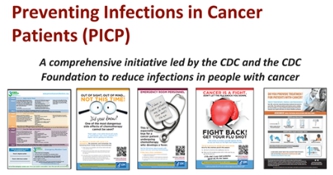Chemotherapy’s Most Serious Side Effect
Posted on by
By Lisa C. Richardson, MD, MPH
Director of CDC’s Division of Cancer Prevention and Control
Like many doctors across the country, I can tell right away when a random phone call from a colleague or friend isn’t so random. It takes me only 30 seconds to know that cancer has struck again and, this time, close to home.
“Lisa, I just got off the phone with my sister and she just found out she has…” Fill in the blank with any stage or type of cancer and the fear I hear in their voice is exactly the same. During that call, I’m no longer someone’s boss, friend, or sister, but rather someone to ask questions that they may feel strange asking someone else.
As an oncologist and lead investigator of the CDC’s Preventing Infections in Cancer Patients program, I am proud to be a part of a program that educates and empowers people with cancer. I’ve seen firsthand the difference straightforward information can make.
Whether it’s one of my patients or a friend, I’m often asked about the side effects of chemotherapy. Usually, they want to know if they’ll lose their hair—a valid and reasonable question. I answer this question for them (depends on the type of chemotherapy), but then start talking about a more serious side effect called neutropenia. It’s one that they might not know to ask about.
Neutropenia, pronounced noo-troh-PEE-nee-uh, is a low white blood cell count. Chemotherapy drugs kill cancer cells as well as healthy white blood cells. Since white blood cells are one of the body’s main defenses against infection, this means you have a higher risk of getting an infection while your white blood cell count is low.

As an oncologist, this side effect is one of my main concerns for my patients. It not only makes them sick, but it can also delay future treatments, put them in the hospital, or cause their death.
I usually try to end every conversation with the following five things to do during chemotherapy:
- Wash your hands with soap and water. If soap and water are not available, it’s OK to use alcohol-based hand sanitizer.
- Treat a fever as an emergency, and call your doctor immediately if you get a fever.
- Know the signs and symptoms of an infection.
- Ask your doctor or nurse when you’re most at risk for getting an infection.
- Get a flu shot.
Lastly, to all of you fighting cancer or caring for someone who is fighting this battle, I encourage you to visit CDC’s Cancer website.
3 comments on “Chemotherapy’s Most Serious Side Effect”
Comments listed below are posted by individuals not associated with CDC, unless otherwise stated. These comments do not represent the official views of CDC, and CDC does not guarantee that any information posted by individuals on this site is correct, and disclaims any liability for any loss or damage resulting from reliance on any such information. Read more about our comment policy ».


As a patient who is also a certified infection preventionist, I am going to ask my oncologist to hire me at a very low wage to teach patients about hand sanitation, preventing surgical site infections,line infections,etc. Since I am on SSD I can’t make much per month.
As someone who is on maintenance chemotherapy, I’ve found avoiding obviously sick and contagious people is my number one. After getting sick 3-4 times from air travel, once hospitalized with febrile neutropenia, I now always carry a N-95 respirator and use it when in confined quarters for an extended period of time if an obviously symptomatic person is nearby.
I wish I had read this article before my Mum had ‘low dose’ chemo for MDS. She ended up with a fungal chest infection which killed her within 8 weeks of diagnosis. At 85 years old I do not think she should have ever been persuaded by professionals to have chemo.